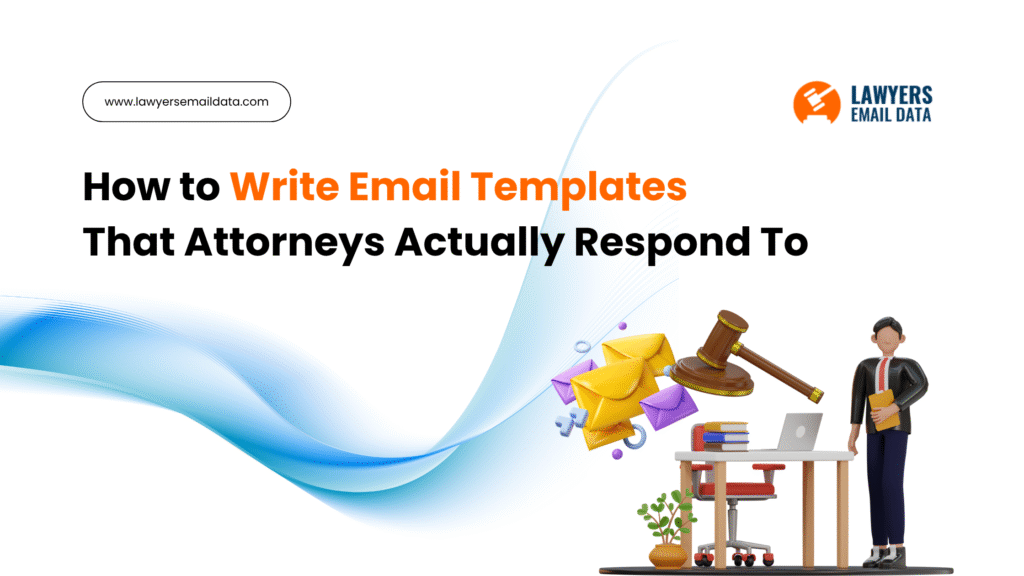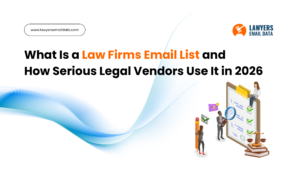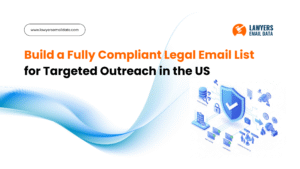Introduction: Why Attorneys Ignore Most Emails
Among the legal professionals, attorneys are among the busiest. Between client meetings, court appearances, and constant casework, their inboxes quickly become overloaded. Cold outreach through lawyer email templates often gets buried or deleted not because attorneys aren’t interested, but because the message doesn’t feel relevant or trustworthy.

In this guide, we’ll break down proven strategies for writing lawyer email templates will notice, trust, and reply to. Along the way, we’ll show how Verified Lawyers Contact Data makes these strategies work in practice.
Step 1: Know Who You’re Writing To
No email template works if you’re sending it to the wrong person. A managing partner has very different priorities compared to an IT director or a junior associate.

Pro tip: Segmenting your outreach by practice area (Personal Injury, Corporate Law, and Family Law) makes your emails highly relevant. Instead of pitching generic solutions, you’re addressing the Attorney’s specific challenges.
Using a verified and segmented Attorneys email list saves you time on this step. Instead of hunting contacts manually, you start with accurate, categorized data that lets you craft targeted templates for each group.
Step 2: Write Subject Lines That Earn a Click
Attorneys skim their inboxes quickly. If your subject line doesn’t immediately show value, your email will never get opened.
Examples of effective subject lines for attorneys:
- “Cut contract review time by 30%-without hiring more staff”
- “Is your firm’s client intake process slowing you down?”
- “Quick question about [Practice Area] cases at [Firm Name]“
Use Clear and Simple Language
Lawyers are busy professionals who don’t have time to decode complex or jargon-filled emails. Keep your language straightforward and to the point.
- Avoid jargon: Use plain, simple words so your message is immediately clear.
- Write in active voice: This keeps your emails direct, showing responsibility and clarity.
- Cut out buzzwords and clichés: Overused terms like “cutting-edge” or “game-changer” can make your message sound like a sales pitch and reduce credibility.
Clear, concise writing increases the chances that your email will be read and responded to.
Notice how these:
- Highlight specific outcomes
- Stay short and direct
- Use personalization (firm name or practice area)
Avoid: Clickbait or overly casual lines like “Hey, got a minute?” Attorneys spot gimmicks instantly.
Step 3: Personalization That Goes Beyond First Names
A Attorney receives countless emails starting with “Hi [First Name]…” and little else personalized. That’s not enough.
Instead, reference something specific about their firm, practice area, or role.
For example:
- “I noticed your firm recently expanded into corporate law-congratulations on the growth. Many firms at this stage struggle with document automation…”
- “Since you specialize in family law, I thought you’d be interested in…”
Large Language Models (LLMs) and AI tools make personalization at scale easier than ever. But accuracy still depends on having the right data in the first place. That’s why businesses rely on Verified Attorney Email List-so personalization is informed, not generic.
Step 4: Keep the Email Short and Valuable
Attorneys don’t have time to read a 600-word sales pitch. Your lawyers email templates should get to the point in under 150 words.
A good structure:
- Introduction (1–2 lines): Why you’re reaching out
- Value (2–3 lines): The problem you solve
- Social proof (1 line): A client, result, or case study
- Call-to-action (1 line): Ask for a quick reply or meeting
Example:
Subject: Is your intake team losing billable hours?
Hi [First Name],
I’m reaching out because many personal injury firms spend 10+ hours weekly on manual client intake. Our tool automates this while keeping everything compliant with bar rules.
Firms similar to yours have reduced intake time by 40% and increased client satisfaction.
Would you be open to a 10-minute call next week to see if this could help your team?
This email is short, clear, and offers value first.
Step 5: Build Trust Through Compliance and Professionalism
Attorneys are especially cautious about confidentiality and compliance. If your email looks sloppy or non-compliant, they won’t respond.
Best practices:
- Always include your real business signature (name, title, firm/company)
- Ensure CAN-SPAM/GDPR compliance with opt-out options
- Avoid exaggerated claims-Attorneys are trained skeptics
- Use a professional tone, even if friendly
Pro tip: A Verified Lawyers Email List helps you avoid embarrassing mistakes like emailing non-Attorneys, outdated contacts, or irrelevant roles.
Step 6: Follow Up Strategically
Most Attorneys won’t reply to your first email. But that doesn’t mean they’re not interested. A polite follow-up can double your response rate.
A good follow-up template:
Subject: Just following up on my note
Hi [First Name],
I wanted to quickly check if you saw my earlier email about [solution]. Many firms in [practice area] are solving [problem] this way.
Should I share a quick case study with you?
Keep follow-ups spaced out (3–5 days apart), and limit to 2–3 attempts.
Step 7: Test, Refine, and Improve
No template is perfect the first time. Track these metrics:
- Open rates (subject line effectiveness)
- Reply rates (message relevance)
- Click-through Rates (if you use links)
Use this data to refine your approach. Sometimes, changing one phrase in the subject line can boost opens dramatically.
Remember: Your results depend heavily on data quality. Clean, verified attorney emails give you accurate metrics, not misleading bounce rates.
Example Templates Attorneys Respond To
Here are three ready-to-use examples:
1. For a Corporate Law Firm Partner
Subject: Reduce contract review bottlenecks at [Firm Name]
Hi [First Name],
Contract reviews can eat up billable hours fast. Our platform automates standard clause review so your associates can focus on complex work.
Would you be open to a 10-minute call to see how this could fit your workflow?
2. For a Personal Injury Attorney
Subject: Faster client intake for PI firms
Hi [First Name],
I noticed [Firm Name] specializes in personal injury. Many PI firms tell us intake slows down case handling. We’ve built a tool that reduces intake time by 40%.
Would you like me to share a short case study?
3. For a Legal Operations Manager
Subject: Compliance-friendly automation for your team
Hi [First Name],
Legal ops teams often struggle balancing efficiency with compliance. Our solution integrates with your existing tools while staying aligned with GDPR and bar requirements.
Should I send you a demo link?
Note: Replace text in [brackets] with actual personalized information.
Why Data Quality Matters
Even the best lawyer email templates fails if sent to the wrong inbox. That’s why businesses spend hours building Attorney contact lists manually-only to end up with outdated or incomplete data.
Starting with a verified, segmented Attorneys email list lets you:
- Target the right practice areas
- Personalize with confidence
- Stay compliant with regulations
- Avoid high bounce rates
At Attorneys Email Data, we provide clean, reliable contacts—so you can focus on writing better emails instead of chasing down addresses.
Conclusion: Turning Templates into Replies
Writing email templates that Attorneys actually respond to isn’t about clever wording-it about relevance, brevity, and trust.
By:
- Targeting the right Attorney
- Writing subject lines that stand out
- Personalizing with real insights
- Keeping emails short and compliant
- Using verified attorney contact data
…your outreach transforms from “ignored” to “answered.”
Attorneys are busy, but they do respond-when the message speaks directly to their needs.
Ready to improve your Attorney outreach? Start with Quality Data and tested templates, then refine based on real results.
Frequently Asked Questions
Use verified contact data, avoid spammy subject lines, and always include compliance details like an unsubscribe option.
Two to three follow-ups spaced out over a week or two are acceptable. More than that risks being seen as spam.
Early mornings (before court sessions) or late afternoons often yield higher open rates since attorneys check emails outside of peak client hours.
Very important-personalized subject lines (e.g., mentioning their practice area) can significantly increase open rates compared to generic ones.
Yes. Mentioning shared connections, bar association events, or industry conferences builds trust and makes your email feel more relevant and credible.



